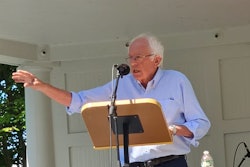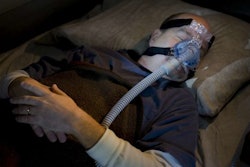The House Committee on Transportation and Infrastructure on Tuesday advanced its portion of the $3.5 trillion 2022 Budget Reconciliation bill, which includes nearly $60 billion in funding for infrastructure and carbon pollution reduction.
The committee, however, did not adopt an amendment that would have provided $1 billion for truck parking projects. The amendment from Rep. Mike Bost (R-Illinois) would have reduced funds available from the Federal Highway Administration for grants for carbon reduction projects to groups that are not states from $3 billion to $2 billion, and instead allocated the other $1 billion for truck parking capacity expansion.
The Owner-Operator Independent Drivers Association said the committee’s rejection of the amendment showed little appreciation for truck drivers in the midst of National Truck Driver Appreciation Week.
“Despite the long history of broad, bipartisan support, numerous government studies and repeated pleas from truck drivers, Democrats on the T&I Committee opposed efforts to address trucking’s number one safety concern, the lack of safe parking,” said OOIDA President and CEO Todd Spencer. “Truckers likely face another five years of a worsening crisis that jeopardizes their safety on a daily basis. It’s tough to swallow the fact that in a year when Congress is authorizing hundreds-of-billions of dollars for infrastructure projects and highway safety programs, not a single penny was set aside for truck parking.”

Spencer added that truck drivers have worked throughout the COVID-19 pandemic, “yet their biggest safety need continues to be ignored by Congress.”
[Related: Senate passes $1 trillion infrastructure bill with AEB, under-21 apprenticeship pilot]
Among the nearly $60 billion allocated to transportation funding, $4 billion is earmarked for the reduction of carbon pollution in the surface transportation sector, which the T&I Committee said is the largest source of transportation greenhouse gas emissions.
Spencer said that addressing truck parking would also help reduce emissions.
“Addressing the parking shortage would also have supported efforts to reduce carbon emission from the transportation sector,” he said. “Truck drivers waste approximately 56 minutes per day looking for parking, all the while needlessly burning fuel, emitting carbon and contributing to congestion.”
Despite the amendment’s rejection, OOIDA thanked Rep. Bost and Rep. Sam Graves (R-Missouri), along with other Republicans on the committee who voted in support of the amendment.
In addition to the $4 billion allocated for reducing surface transportation emissions, the T&I legislation also includes:
- $10 billion to support access to affordable housing and enhance mobility for low-income individuals and residents of disadvantaged or persistent poverty communities
- $4 billion to support neighborhood equity, safety and affordable transportation access
- $6 billion to advance local surface transportation projects
- $500 million to the Federal Emergency Management Agency’s hazard mitigation revolving loan fund program
- $425 million for grants for the construction, retrofit, technological enhancement and updated planning requirements of state, local Tribal and territorial emergency operation centers
- $9.5 billion to the Economic Development Administration to provide investments in persistently distressed communities, provide assistance to energy and industrial transition communities, invest in public works projects, and create regional hubs
- $1 billion to the General Services Administration to invest in high-performance green buildings
- $1 billion for climate resilient Coast Guard infrastructure
- $2.5 billion to the Maritime Administration to support more sustainable port infrastructure and supply chain resilience
- $2 billion to invest in sewer overflow and stormwater reuse projects, as well as a greater federal cost share for projects that serve financially distressed communities
- $500 million in grant assistance to invest in the backlog of wastewater projects on Tribal lands
“With this legislation, we can reduce carbon pollution from the transportation sector that’s driving the climate crisis and make communities more resilient to extreme weather events; connect people with good-paying jobs and affordable housing; address the planning mistakes of the past by reconnecting communities; make meaningful investments to plan for and develop high-speed rail projects; provide more people access to clean water; and make our aviation and maritime sectors greener,” said T&I Committee Chair Rep. Peter DeFazio (D-Oregon). “I look forward to seeing Congress pass this once-in-a-generation legislation because we can’t afford to squander this opportunity.”










